The 20-meter telescope arrived as a guest at Green Bank in 1994. It was built by RSI and installed by the US Naval Observatory as a member of its various Earth observing programs. In 2000, USNO cutbacks shut it down, but we kept it running to use as a receiver-testing telescope. In 2012, it became the first radio telescope in the UNC’s Skynet project of remotely-controlled educational telescopes.
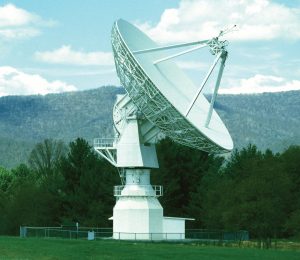
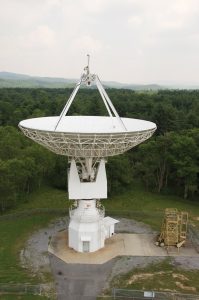
Skynet’s First Radio Telescope
The 20-meter telescope arrived as a guest at Green Bank in 1994. It was built by RSI and installed by the US Naval Observatory as a member of its various Earth observing programs. In 2000, USNO cutbacks shut it down, but we kept it running to use as a receiver-testing telescope. In 2012, it became the first radio telescope in the UNC’s Skynet project of remotely-controlled educational telescopes.
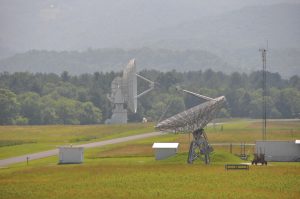
Educational Telescopes
The 20-meter and the 40-foot telescopes in Green Bank, West Virginia are full-time educational telescopes used by students around the country. School groups pitch their tents at the 40-foot during their observations. The 20-meter, however, can be run over the Internet through the University of North Carolina’s Skynet program.
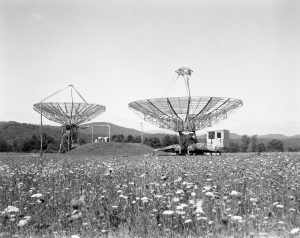
Testing the new 42-foot
The 42-foot portable radio telescope (right) working next to the permanent 40-foot telescope at Green Bank, West Virginia. From 1967 through 1976, the 42-foot served as the fourth, remote member of the Green Bank Interferometer (GBI), the test array for the Very Large Array (VLA). The 42-foot’s trailer carried the dish as stacked panels and included a built-in, donut-shaped drive and a small control room.
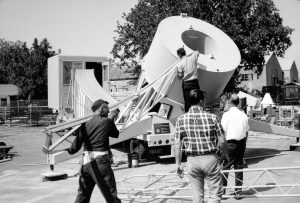
The 42-foot Collapsable Telescope
Disassembling the 42-foot portable radio telescope. The 42-foot’s trailer carried the dish as stacked panels and also integrated the telescope’s donut-shaped drive and a small control room. In the mid-1960s, this little telescope served as the fourth, remote member of the Green Bank Interferometer (GBI), the test array for the Very Large Array (VLA).
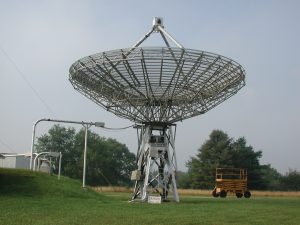
More Than Meets the Eye
The 40-foot telescope in Green Bank, West Virginia is a lightweight, transit telescope. In 1962, it became the world’s first full-automated radio telescope. From 1961 until 1967, the 40-foot merrily went along observing a small catalog of radio sources whose brightness change over time. The data it collected traveled from the telescope’s prime focus receiver through a cable (at left) and into a control building. In 1987, it was re-purposed as an educational telescope.





